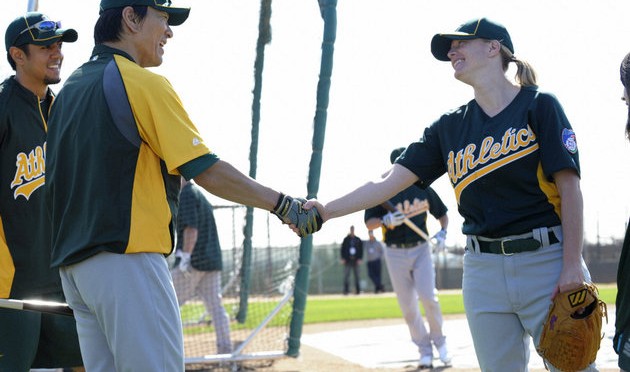This fall, Justine Siegal made history by serving as a guest coach for the Oakland Athletics' instructional league. This isn't the first time she's been the first woman on a male-dominated coaching staff. In 2011, Justine was the first woman to throw an MLB batting practice when she attended the Cleveland Indians spring training. Since then, she has thrown batting practice for five more teams. With all of this inspirational work, we knew we had to sit down and talk to Justine. Check out our conversation below.
Up2Us Sports (US): What do you love most about the game of baseball? Justine Siegal (JS): I love the complexity of the game and yet the simplistic idea that it is a bat-and-ball sport. I love what it feels like to throw a perfect curveball. To me, holding a baseball is like holding perfection.
US: You’ve been working diligently for decades and are now making history as the first female coach in Major League Baseball. What does that feel like? Did you set out to be a pioneer? JS: I have wanted to be a baseball coach since I was 16. It didn’t occur to me that I would be a pioneer, I just knew I loved baseball. However, I knew what I was trying to do was different. It was also different when I was fighting for the right to play the game. So really, I was following my passion. But I certainly understood as I got older my role as a role model and how important that was to the girls behind me.
US: Tell us about Baseball For All – how it started, how it's grown and where it's going. JS: Baseball For All is a national nonprofit providing opportunities for girls in baseball as players, coaches, umpires, and other leadership positions. Our goal is getting girls baseball leagues around the country. Our next big event is the 2016 Nationals in San Francisco, where we will have playing opportunities at the 8u, 10u, 13u, and 16u age groups. I started Baseball For All when I was just 23 years old. I was tired of waiting for opportunities so I decided to create them.
US: Baseball for All is a member organization of Up2Us Sports, whose signature program, Coach Across America, recruits and trains coaches to serve in communities that lack positive adult role models. Why do you think it's important for children to be involved in sports and have a coach who teaches them more than just about the sport? JS: The best part of sport is how we can learn about ourselves and who we want to become. Sport is a great teacher for values like: humility, hard work, forgiveness, and working with others. It’s instrumental that we have well trained coaches who can teach positive values to help our girls and boys grow into their best selves.
US: What advice do you have for women and girls who encounter doubters or are trying to overcome sexism and discrimination on and off the field? JS: Just keep going strong. You cannot control how people treat you. The only thing you can control is how you respond. I decided to be kind when others were mean. Not so I could be liked, but so I could keep my passion moving forward. I recommend staying on your plan. Don’t let someone else derail you.
US: Your story is about perseverance and possibilities and you are currently a role model to so many. Who were your role models growing up? JS: I looked for the goodness in people all around me. By watching others I could determine who I wanted to be.
US: Do you hope to influence the pro players (on the Oakland Athletics) you're working with off the field as well? JS: Of course. I hope that my being there makes them be better fathers and husbands by seeing that gender stereotypes are unnecessary and constraining. I also think I demonstrate to them what never giving up looks like and how important giving back to the community is.
US: Have you encountered any sexism in your new role with the A's? JS: Beyond a tweet here and there I have not experienced sexism in my new role. It’s been amazing.
US: Any predictions on when a woman will make it to the major leagues? Who should we be watching out for? JS: I am not sure about MLB but I would love to see a women’s professional baseball league. I think the WNBA has been instrumental in the growth and dreams of girls basketball. I’d like to see the same opportunities occur in baseball.
US: Why is it so important to have more female coaches? JS: This is a huge question with a lot of layers. But at its basic level, it’s important to have female coaches in men’s programming because we bring a diverse perspective. A coaching staff is stronger when diversity exists. If every coach knows the same thing and comes from basically the same background then there is risk for a stale staff. It’s also important that girls and women realize that these jobs are open for them; that they know they are not judged by their gender but by what they can bring to the team. I think that’s what all coaches want - to be seen for who they are and how they can contribute to the team.
When she isn't coaching professional baseball players, Justine coaches kids at Baseball for All, a Up2Us Sports member organization with a mission to provide meaningful instruction and opportunity in baseball, especially for girls.






